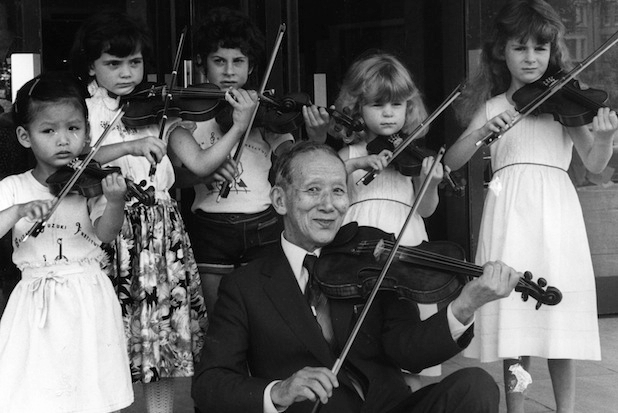Do you ever wonder, as your little darling balks at doing her violin or piano practice again, what all the pain is for? All those battles, and then when she escapes your clutches she’ll give it up. In later life the blanket of amnesia will fall over those childhood years and it might be as if she’d never played at all.
I learnt the violin by the Suzuki method from the age of three until about 14. It was a newish fad back then in London, although Shinichi Suzuki, the movement’s founder, was in his eighties and had been teaching in Japan since the war. Suzuki’s idea was simple and had come to him as he watched toddlers learn to speak: start a child young enough and he will learn music the way he does language — naturally and easily. The ‘mother tongue’ philosophy, it was called.
The ideal Suzuki child is immersed in music. He spends his first year without a bow, simply holding a tiny violin under his chin, listening. When he gets his bow, the ideal Suzuki child is so keen to practise he often chooses to do more than his mandatory hour a day. I was not an ideal Suzuki child. My mother still bears the psychic scars of dragging me to practice. Sometimes even now, she murmurs as if traumatised: ‘Open A string, Mary please, open A.’ I remember more than once standing, bow dangling from a finger, thinking darkly that I would never, ever speak to her again.
And was it worth it, for all those years? I don’t play these days but every now and then, hoovering beneath the sofa, I bump into the violin in its case and consider the question. Or I did, until one evening quite recently, when the answer became clear.
I’d gone to a concert put on in honour of my old teacher, a brilliant, vital woman called Helen Brunner who introduced the Suzuki method to this country. The concert kicked off with a performance by those who’d been her star pupils back in the day: the one-time Suzuki ‘gold’ group, now in their thirties and forties. There they stood on stage, lawyers, bankers, teachers, all in rows with perfect Suzuki posture: feet apart, violins up, looking just as they had at six. Then they began to play, Bach’s Brandenburg Concerto No. 3, and within a few seconds I was in tears.
As a child, your life is not your own — you bob along in some adult’s wake and then, anyway, you forget it all. It’s hard to know what’s formed you in the end. Was it your parents? School? The football team? It took the gold group concert for me to realise quite suddenly how formative my Suzuki years had been.
They began in 1979 when my mother rang on Helen Brunner’s doorbell. Beside it was a typed label: ‘If you press this bell your life will change’. Every week after that I pressed the bell and scuttled into the studio. Helen was (is still) exceedingly tall and blazed with energy. I was small and felt exposed under her luminous stare, and I never became one of her stars, I never made the gold group, but it’s true my life did change.
From the age of three I had a thing, something that defined me. This is invaluable for a child. Maybe I was Mary the absent-minded, but I was also Mary who played the violin. If you start young your instrument becomes part of you; its form and feel. A fiddle player is marked out in public by the reddish bruise a chin-rest makes on the underside of the jaw. I’ll always know the way a violin balances by the scroll on one finger, or tucks under a crooked right arm; the creak of rosin on a bow.
Nothing in my life since has taught me so ruthlessly that it takes hard work to create something worthwhile. For the first few years of playing, the violin sounds like a dying cat, or bike brakes in the rain. There are no short-cuts, no scams. But then (after a decade or so) it’s a joy.
Suzuki is often accused of being a cult and for a brief moment, as I mopped up my tears, I wondered whether I’d been brainwashed. It’s true Dr Suzuki did have an evangelical streak: his stated aim was to create not professional musicians but good citizens. He said, ‘If a child hears fine music from the day of his birth and learns to play it himself, he develops sensitivity, discipline and endurance. He gets a beautiful heart.’ Now, this sounds very dubious to your average Brit, but in a way Suzuki was right. Not that we developed beautiful hearts, not those of us in the brown group anyway — but just as the novels you read when young shape your feelings and thoughts, so, as we sawed away each day at Bach and Mozart, they affected us.
Because of the emphasis on practice and repetition, there’s much talk online of the Suzuki method creating ‘automatons’ or ‘stamping out individuality’. To this I say: horseshit. Talk of individuality misses the point, not just of Suzuki, but of music, which isn’t about showing off at all. You have to practise to be worth listening to, and this takes sacrifice, and not just from the pupil. The Suzuki parent is required, with no exceptions, to attend lessons and to learn as their child learns every step of the way. It occurred to me during that concert, as I realised belatedly how much I felt for the violin, that I’ve never thought in 36 years to thank my poor mum. So much for sensitivity.
One thing about Suzuki’s philosophy does seem askew. Suzuki thought that talent isn’t inherited but taught; that every child can learn to play equally well. Here I think he’s wrong. Helen Brunner’s Notting Hill gang knew right from the start which ones of us were best. I could tell you their names even now.
As the concert drew to an end, Helen picked up her own violin and appeared on stage to lead the gang in a round of Pachelbel’s Canon. She stood tall like a mast, seeming somehow to conduct energy from elsewhere into the group. When they all took their bow, I got to my feet and clapped to them over the heads of the sitting audience, feeling like a seal stranded on the beach signalling to his colony out at sea.







Comments